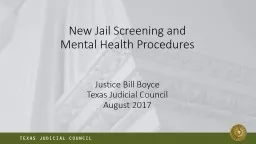PPT-New Jail Screening and Mental Health Procedures
Author : briana-ranney | Published Date : 2018-03-22
Justice Bill Boyce Texas Judicial Council August 2017 Roadmap Segment One Overview Segment Two Screening amp Assessment Segment Three Personal Bonds Segment Four
Presentation Embed Code
Download Presentation
Download Presentation The PPT/PDF document "New Jail Screening and Mental Health Pro..." is the property of its rightful owner. Permission is granted to download and print the materials on this website for personal, non-commercial use only, and to display it on your personal computer provided you do not modify the materials and that you retain all copyright notices contained in the materials. By downloading content from our website, you accept the terms of this agreement.
New Jail Screening and Mental Health Procedures: Transcript
Download Rules Of Document
"New Jail Screening and Mental Health Procedures"The content belongs to its owner. You may download and print it for personal use, without modification, and keep all copyright notices. By downloading, you agree to these terms.
Related Documents














